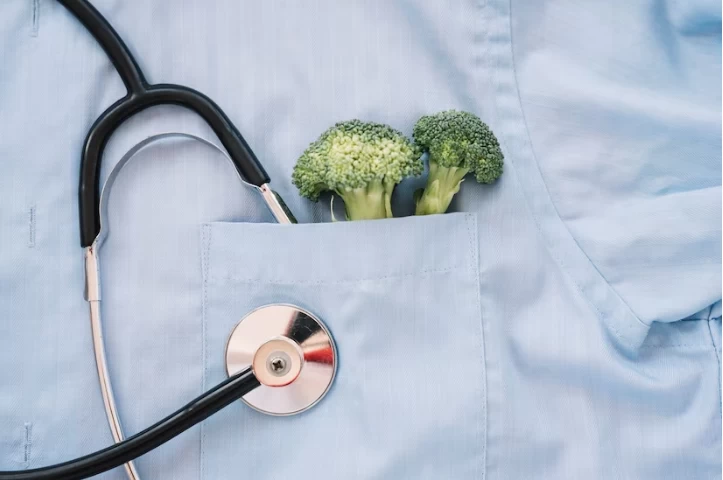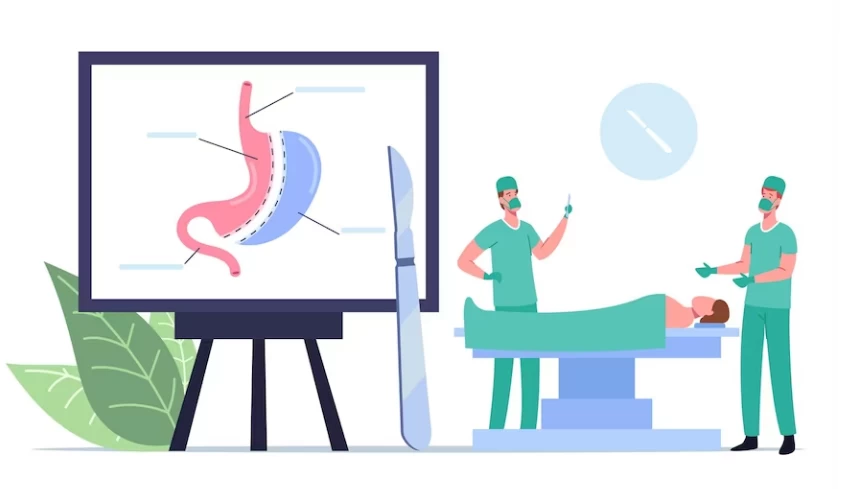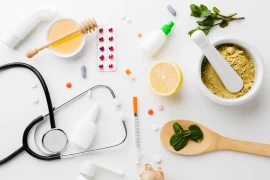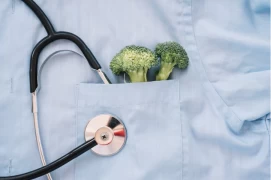
Postoperative Nutrition After Gastric Surgery
- Postoperative Nutrition After Gastric Surgery
- Initial Phase Nutrition:
- Nutrition During the Transitional Phase:
- Nutrition in the Long-Term:
Gastric surgery is a surgical procedure commonly chosen for weight loss or the treatment of obesity. Postoperative nutrition following such surgery is crucial to meet the body's needs and ensure healthy weight loss. Carefully planned diet after gastric surgery supports postoperative recovery, prevents nutrient deficiencies, and helps patients achieve long-term success.
Postoperative nutrition plans for gastric surgery are typically divided into three phases: the initial phase, the transitional phase, and the long-term phase.
Initial Phase Nutrition:
The initial phase of postoperative nutrition begins immediately after the surgery and aims to assist in the healing of the digestive system. During this phase, a liquid-based diet is generally recommended. Here's more information about nutrition during the initial phase after gastric surgery:
- Fluid Intake: Consuming liquids is important during the first few days after surgery to meet your body's fluid needs. Your doctor will provide guidance on which liquids to consume. Generally, recommended liquids include water, herbal teas, low-fat or fat-free broth, freshly squeezed fruit juice, or vegetable juice. These liquids provide the necessary hydration for your body and support nutrient intake.
- Frequent and Small Portions: Eating may be challenging during the initial postoperative period due to the reduced size of the stomach. Therefore, it is important to consume frequent and small portions of food. Drinking liquids slowly and in small sips allows for fluid intake without exerting excessive pressure on the stomach. The goal during this stage is to minimize bloating and discomfort in the stomach and support the healing process.
- Protein Consumption: Protein intake is important during the postoperative period as proteins are essential for tissue repair and healing. You can choose protein-rich liquids or dietary supplements. Your doctor will specify suitable protein sources and portion sizes for you. Protein-rich foods may include soft cheese, yogurt, milk, protein powders, and softly cooked eggs.
- Vitamin and Mineral Supplements: After gastric surgery, nutrient absorption can be altered, leading to potential deficiencies in certain vitamins and minerals. Therefore, it is important to regularly take the vitamin and mineral supplements recommended by your doctor. Commonly recommended supplements include B12 vitamin, iron, calcium, vitamin D, and folic acid. By taking supplements at the correct dosages and regularly, you can prevent nutritional deficiencies.
- Communication with Your Doctor: When developing your postoperative nutrition plan, it is important to maintain regular communication with your doctor. Your doctor can identify specific requirements related to your surgery and closely monitor your recovery process. If you have any questions or concerns regarding nutrition, it is important to consult your doctor.
Please note that this translation has been provided by an AI language model and may not be perfect. It is always recommended to consult with a healthcare professional or registered dietitian for personalized advice regarding postoperative nutrition after gastric surgery.

Nutrition During the Transitional Phase:
Nutrition during the transitional phase after gastric surgery encompasses the first few weeks following the operation when the digestive system is recovering and transitioning to regular solid foods. The dietary approach gradually changes during this phase, and soft, pureed, or mashed foods are preferred. Here's more information about nutrition during the transitional phase after gastric surgery:
- Soft and Pureed Foods: During the transitional phase, your digestive system may still be sensitive, so it is recommended to consume soft and pureed foods. These foods facilitate the digestion process and are easily digestible. Examples include pureed vegetables (carrots, zucchini, potatoes, etc.), boiled or steamed soft vegetables, pureed fruits, yogurt, soft cheeses, and pureed sources of protein such as chicken or fish.
- Slow and Small Portions: It is important to consume your meals slowly, chewing thoroughly during the transitional phase. Eating slowly supports the digestion process and avoids overloading the stomach. Additionally, portion control is important. Consuming frequent and small meals allows you to obtain sufficient nutrients without exerting excessive pressure on the stomach.
- Protein Consumption: Proteins are essential components for tissue repair and healing. Protein intake remains important during the transitional phase as well. You can focus on consuming pureed or mashed soft protein sources. These may include pureed or blended soft meats (chicken, turkey, fish), soft cheeses, yogurt, and pureed legumes. You can also consider protein supplements recommended by your doctor.
- Fluid Intake: Fluid intake remains important during the transitional phase. Consuming an adequate amount of water is crucial for hydration and supports digestion. Fluid intake also helps reduce the risk of constipation. However, it is important to regulate fluid consumption according to your doctor's instructions. For example, limiting fluid intake around 30 minutes before and after meals can increase the feeling of fullness.
- Communication with Your Doctor and Dietitian: Maintaining regular communication with your doctor and dietitian is important when developing your transitional phase nutrition plan. They can provide you with a suitable nutrition plan tailored to your specific surgical requirements and monitor your progress. Additionally, it is important to reach out to them if you have any questions or concerns.
Please note that this translation has been provided by an AI language model and may not be perfect. It is always recommended to consult with a healthcare professional or registered dietitian for personalized advice regarding postoperative nutrition during the transitional phase after gastric surgery.

Nutrition in the Long-Term:
Nutrition in the long-term after gastric surgery refers to the ongoing dietary approach after the completion of the postoperative recovery process. It is important to carefully maintain a nutritious diet during this period to meet your body's needs, achieve weight loss or weight maintenance goals, and sustain a healthy lifestyle. Here's more information about nutrition in the long-term after gastric surgery:
- Balanced and Varied Diet: Adopting a balanced and varied dietary program is crucial for creating a healthy nutrition plan in the long-term. This ensures that you receive adequate amounts of nutrients from all essential food groups. You can incorporate foods that include proteins, fiber, vitamins, minerals, and healthy fats into your nutrition plan. Examples include fresh fruits and vegetables, whole grains, lean protein sources, healthy fats (avocado, olive oil, nuts), and low-fat dairy products.
- Protein Consumption: Protein intake continues to play a significant role after gastric surgery. Proteins are necessary for tissue regeneration and repair in the body. You should consume sufficient protein daily according to the recommended amount by your doctor. Protein-rich foods include chicken, fish, eggs, dairy products, tofu, legumes, and lean meats. Additionally, protein powders or supplements can be used under your doctor's guidance.
- Slow and Thorough Chewing: It is important to chew your food slowly and thoroughly after gastric surgery. This aids the digestion process and increases the feeling of fullness in the stomach. You can facilitate digestion by breaking down food into smaller pieces and thoroughly chewing it. Eating quickly or taking large bites may lead to stomach discomfort and indigestion.
- Portion Control: Portion control is crucial after gastric surgery due to the reduced stomach capacity. Consuming meals in small portions prevents overeating and assists with weight control. Serving meals on smaller plates or bowls and eating slowly facilitates portion control.
- Vitamin and Mineral Supplements: After gastric surgery, certain vitamin and mineral deficiencies may arise. It is important to regularly take the vitamin and mineral supplements recommended by your doctor. Commonly recommended supplements include B12 vitamin, iron, calcium, vitamin D, and folic acid. By consistently following your doctor's instructions on supplement usage, you can prevent nutrient deficiencies.
- Hydration: Adequate water intake remains important in the long-term as well. Pay attention to your daily water intake to ensure hydration, support digestion, and maintain proper bodily functions. Opt for water instead of carbonated beverages, sugary drinks, and alcohol.
In conclusion, postoperative nutrition after gastric surgery is important for meeting your body's needs and achieving healthy weight loss. Working with your doctor or a nutrition specialist can assist in creating a personalized nutrition plan. Remember, individual needs may vary, so it is important to establish a tailored nutrition plan for your specific requirements.






